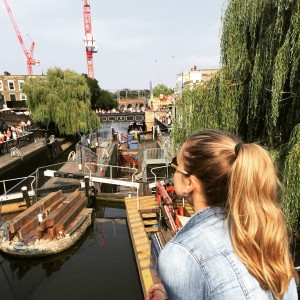 On my first night in London (the real one), my brother and I went to a play at the Almeida theatre called They Drink It In The Congo about a Kenyan-born British woman trying to organize a Congolese festival to raise awareness about the Congo.
On my first night in London (the real one), my brother and I went to a play at the Almeida theatre called They Drink It In The Congo about a Kenyan-born British woman trying to organize a Congolese festival to raise awareness about the Congo.
I have to admit, I knew very little about the play’s premise. My brother sent me links to a few productions we could see while I was in town, but was a busy week at work, so I didn’t have the opportunity to look into them closely. But come to London and not take advantage of the incredible theatres available? I was up for anything.
The play opened with more than a few laughs. It had punchy jokes but, more importantly, a large man in a pink suit who seemed to have no purpose on stage other than to announce, “Telephone!” when someone’s cellphone went off or narrate emails as characters read them on stage. It was funny but, as my brother questioned at intermission, couldn’t that be done by a voice off-stage?
But a flashback scene later on in the play revealed his true purpose (SPOILER): the Brit organizing the festival had visited the Congo on an aid trip and ended up in the middle of a conflict between a family and the militia; the family is torn apart and the father suffers a massive head wound from a machete—the man in the pink suit. That scene, with the man’s cries for help and her inability to do so, haunts her. She carries him around. Every conversation, every interaction, he is there.
The play was fantastic. Though travel exhaustion tempted my eyes to close several times, I was compelled to stay awake. The content about the Congo’s conflict was complex and dense; the characters portrayed were vibrant and layered.
But I found myself thinking primarily about the dynamic between only two characters long past the final applause: the woman the entire play centred around and the man unseen to all the other characters on stage. The man in the pink suit was real and present to her alone, but his existence in her past affected everyone around her.
And so, I wondered: How often do people bring their ghosts with them? Who is in the room with you that you can’t see? What words do they whisper to their host that drive the action of the scene?
When we ask questions, genuine inquiries, about the reasons behind our boyfriend/brother/mother/grandfather’s actions, sometimes we see the faint outlines of these ghosts, or at least imagine we can. When they are willing to share a story, we see the past experiences of their current perspective or purpose, a past that continues to echo in the lives of these people we care about. But, most of the time, we have to ask. We have to want to see the unseen.
